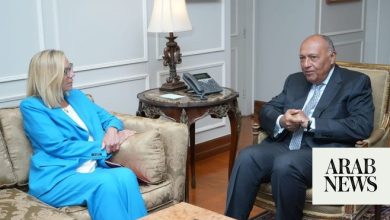Pakistan suspends mobile phone services as voting begins

[ad_1]
ISLAMABAD: The Pakistan government on Thursday cut mobile phone services across the country as millions went to the polls in a closely-watched general election amid multiple crises, including a surge in militancy, plaguing the nuclear-armed, South Asian nation of 241 million.
Attacks by religiously motivated militant groups like the Tehreek-e-Taliban Pakistan (TTP) and ethno-nationalist Baloch insurgents have surged in the run-up to elections. On Wednesday, a day before polls opened, at least 28 people were killed and over 40 injured in violence in the southern regions of Pakistan, including two separate blasts targeting election offices.
“As a result of the recent incidents of terrorism in the country, precious lives have been lost, security measures are essential to maintain the law and order situation and deal with possible threats,” the Pakistani interior ministry said on Thursday morning, barely minutes before voting opened at 8am.
“Hence the decision has been made to temporarily suspend mobile services across the country.”
Access Now, a non-profit organization founded in 2009 and focused on digital civil rights, on Wednesday called on Pakistan’s caretaker government, which is constitutionally mandated to organize elections, to “ensure open and secure Internet access throughout the 2024 elections.”
“Public institutions have a duty to ensure that people can access open, secure, and free Internet when they need it the most — including during important national events,” the body said. “During the 2024 general election, we urge authorities in Pakistan to #KeepItOn.”
The mobile phone network suspension comes as widespread allegations of manipulation and pre-poll rigging have cast a shadow over the general election, a historic event that will mark only the country’s third ever democratic transition of power.
Tensions between civilian politicians, particularly from the Pakistan Tehreek-e-Insaf (PTI) party of jailed former Prime Minister Imran Khan, and the powerful military, which has ruled for over three decades of Pakistan’s history since independence in 1947, are running high as millions of Pakistanis go out to vote. The military strongly denies interfering in politics.
Khan was ousted from the PM’s office by a parliamentary vote of no-confidence in April 2022 and has been in jail since August last year, angering his millions of supporters. He is also disqualified from running for public office for ten years.
Khan was handed down three different jail sentences this month and faces dozens of other legal challenges, including one case in which he is accused of ordering violent attacks on military installations on May 9, 2023, which could entail the death sentence.
In the run-up to polls, Khan’s PTI has complained of a widening crackdown against the party, including not being allowed to campaign freely, and questions surround the legitimacy of an election that Khan, the main opposition leader and arguably the country’s most popular politician, cannot contest.
Khan’s main challenge is expected to come from the Pakistan Muslim League-Nawaz (PML-N) party led by three-time former Prime Minister Nawaz Sharif, who returned to Pakistan last year from self-imposed exile to lead the party ahead of national elections.
In the last election in 2018, it was Sharif’s PML-N that widely complained of rigging and manipulation. A year earlier, Sharif had been ousted by the Supreme Court as prime minister and disqualified for life from running for public office. But as he returned to Pakistan in October last year, corruption cases against him were dropped and the bar to contest polls was lifted and Sharif is now being seen as the frontrunner in elections, with an edge over rivals due to the backing of the military.
Sharif has denied the generals have thrown their weight behind him.
The election also comes at a time of growing economic instability, with the economy beset by record high inflation, falling foreign exchange reserves, a depreciating currency, low consumer confidence and slow growth caused by tough reforms carried out to meet the conditions of a last-gasp $3 billion bailout from the International Monetary Fund (IMF) approved last year.
MEHREEN ZAHRA-MALIK
&
MUHAMMAD IBRAHIM
[ad_2]
Source: Arab News




